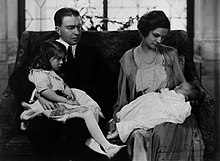Henry Francis du Pont
Henry Francis du Pont | |
|---|---|
 du Pont family in 1922 | |
| Born | May 27, 1880 |
| Died | April 11, 1969 (aged 88) |
| Education | Harvard University (1903) |
| Children | Pauline Louise du Pont (1918–2007) Ruth Ellen du Pont (born 1922). |
| Parent(s) | Henry Algernon du Pont Mary Pauline Foster |
Henry Francis du Pont (May 27, 1880 – April 11, 1969), was an American horticulturist, an expert and collector of early American furniture and decorative arts, particularly of Federal furniture, and a member of the Du Pont family.[1] For more than 40 years, he was recognized as a premier breeder for his herd of Holstein-Friesian cattle.
Through the decades, he expanded his mansion sixfold, resulting in 175 rooms full of fine furniture and furnishings. In 1951 he established his estate of Winterthur in Delaware as what has been recognized as the premier museum of American Decorative Arts. It is also known for its extensive gardens, whose design and development he had supervised for decades. He acted as an adviser and consultant on the renovation of the White House in 1961-1963, using his wide circle of contacts to gain donations of high-quality antiques and fine art to represent the best in American design.
Biography
He was born on May 27, 1880 at Winterthur, Delaware. He was the only son of Henry Algernon du Pont and Mary Pauline Foster to live to maturity.
He studied horticulture at the Bussey Institution at Harvard University, graduating in 1903.
In 1916, he married Ruth Wales (1889–1967). They had two children, Pauline Louise du Pont (1918–2007) and Ruth Ellen du Pont (born 1922).
Beginning in the 1920s, Du Pont began breeding Holstein-Freisian cattle, originally bred in northern Netherlands and Germany. He became recognized as one of the premier breeders in the United States. The Winterthur herd of dairy cattle was well known in farming and agricultural circles from the 1920s until Du Pont's death in 1969.
A collector of Americana, over decades Henry Francis Du Pont expanded his family estate from the 30-room house he inherited to a 175-room mansion. In addition, he supervised the design and development of gardens near the house, as well as landscaping throughout the large estate grounds. In 1951 he established it as the Winterthur Museum & Country Estate. The museum is generally recognized as the premier collection of American Decorative Arts in the world; it includes many period rooms, some rescued from houses before their demolition.
Du Pont was asked by Jacqueline Kennedy to help oversee the renovation of the White House in 1961-1963. He used his contacts and expertise to acquire donations of fine art and high-quality furniture to the effort so that it would reflect the best in American design. He sometimes clashed with Kennedy's interior designer Stéphane Boudin.
He died on April 11, 1969.[1][2] He was buried in Du Pont de Nemours Cemetery.
Legacy
Following his death, the Winterthur Museum sold his herd of dairy cattle. Its leaders chose to concentrate on the presentation and preservation of Du Pont's antique collection, and the beautiful gardens and landscape of the estate.
At the request of his nephew, John Eleuthère du Pont, he provided land for a site for the construction of the Delaware Museum of Natural History, which opened near Winterthur in 1972.
References
- ^ a b "Henry Francis du Pont and Winterthur". Winterthur. Retrieved 2012-11-25.
Henry Francis du Pont (1880–1969), the only son of Henry Algernon and Pauline du Pont, was born at Winterthur ...
- ^ "Henry Francis du Pont, 88, Dies; Art Collector and Horticulturist; Great-Grandson of Chemical Concern's Founder Set Up Winterthur Museum". New York Times. April 12, 1969. Retrieved 2012-11-25.
Henry Francis du Pont, the last great-grandson of EI du Pont de Nemours, founder of the chemical concern, died early yesterday ...
{{cite news}}: Cite has empty unknown parameter:|coauthors=(help)
